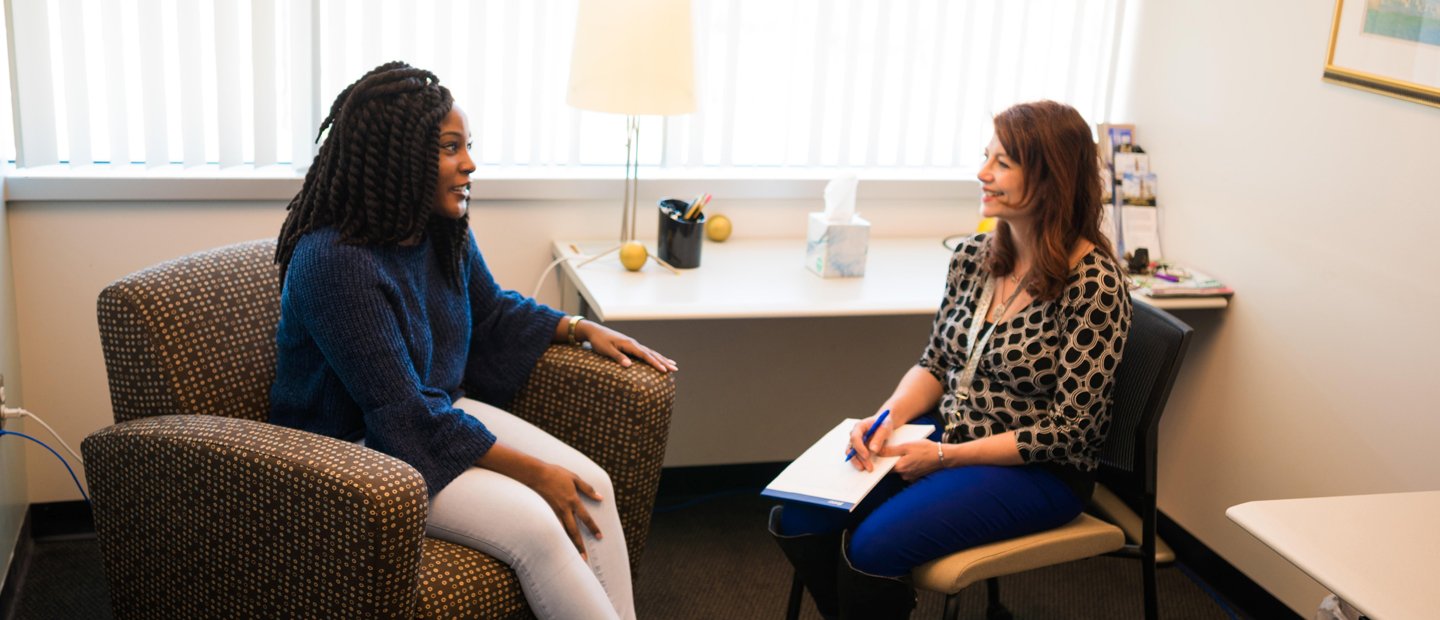
Doctor of Philosophy in Education: Counseling
The Doctor of Philosophy in Education: Counseling program is a 64-credit hour program designed for individuals who wish to become leaders in the field areas of advanced clinical practice, mental health care administration, counseling research and counseling supervision. The curriculum has been established according to the guidelines set forth by the Council on the Accreditation of Counseling and Related Educational Programs (CACREP).
Apply nowRequest more information
- Addiction counseling
- Advanced career counseling
- Child and adolescent counseling
- Couple and family counseling
- Mental health counseling
- Theory pertaining to the principles and practice of individual counseling, group work, consultation and counselor supervision
- Instructional theory and methods relevant to counselor education
- Design and implementation of quantitative and qualitative research methodology
- Models and methods of assessment and appraisal
- Ethical and legal issues; career development, implications of sociocultural, demographic and lifestyle diversity
- Philosophical and professional orientation
Applications will be accepted until December 15 of each year.
Application process:
- Apply online
- Department requirements include:
- Master’s degree in counseling or related field
- Written goal statement
- Professional experience
- Official GRE test scores
- Current Curriculum Vitae
- Writing sample
- Interview for applicant finalists
- Final admission recommendations are then forwarded to the Office of Graduate Admissions by the Department of Counseling faculty working as a committee of the whole.
The Ph.D. of Education: Counseling is a cohort-based program.
For additional information, contact the doctoral coordinator, Dr. Michael P. Chaney, at [email protected].
Department of Counseling Mission Statement
The counseling profession helps people to become self-aware, growth oriented, and effective in mastering the challenges of life. Counselors, as skilled, perceptive, and broadly educated professionals, assist clients in identifying areas for improvement and in carrying out changes that promote life fulfillment. Drawing upon a foundation of research and theory in philosophy, psychology, and education, counselors use therapeutic skills and consultation techniques with both individuals and groups. In any setting, the goal of counseling is to help people expand their potential, facilitate their development, and live more satisfying and productive lives.
Our primary mission in the Department of Counseling is to assure that our graduates demonstrate the skills, abilities, and expertise required of a professional counselor in a diverse society. As a counseling faculty, we are committed to continued study of the most current issues related to the field of counseling through the professional literature and by association with counseling and related professional organizations. We also remain active in research endeavors that maintain an environment of inquiry. The faculty aims to provide an educational environment which nurtures rigor and a desire to learn and fosters collaborative relationships between faculty and students.
The faculty of the Department of Counseling is committed to attracting a diverse pool of graduate students who possess the intellectual ability and the personal characteristics that indicate a successful future as counseling professionals. Most of our students are drawn from Southeastern Michigan, but increasingly we attract students who move here for the program, some from other states and countries. We intend to provide every student with a thorough and rigorous academic program in the core program content areas of human growth and development, social and cultural foundations, helping relationships, group work, career/lifestyle development, appraisal, research/program evaluation, and professional orientation. We intend to provide each student with appropriate experiential learning opportunities to develop counseling and research skills. As a faculty, we are committed to creating a supportive, challenging learning environment in which students and faculty join in discovery learning and contribute to the understanding of the counseling process. We engage in activities that contribute to the well-being of our community through on-campus and off-campus service delivery projects. Both students and the community benefit from our continued commitment to providing a model counseling program. We continue to develop our programs to provide students with the resources, knowledge, and experiences to demonstrate excellence in counseling practices. For specific department goals refer to the website at: oakland.edu/counseling.
GENERAL PROGRAM OBJECTIVES
- Goal 1: to develop knowledge and skills regarding life-span growth and development.
- Goal 2: to develop knowledge and skills about the social and cultural foundations of the counseling profession.
- Goal 3: to develop knowledge and skills about counseling and helping relationships.
- Goal 4: to develop knowledge and skills about Group Dynamics and Group Counseling.
- Goal 5: to develop knowledge and skills about appraisal, including educational, intelligence, and personality tests; evaluation and measurement principles; and ethical issues related to the fair use of tests.
- Goal 6: to develop knowledge about the research and evaluation process in counseling.
- Goal 7: to develop knowledge and skill about lifestyle and career development.
- Goal 8: to develop skills in the application of counseling techniques and procedures to clients in supervised internships and practicum.
- Goal 9: to develop knowledge about professional, ethical, and legal responsibilities as a counselor.
- Goal 10: to develop the knowledge and skills necessary for specialized practice in selected counseling areas.
Department of Counseling







